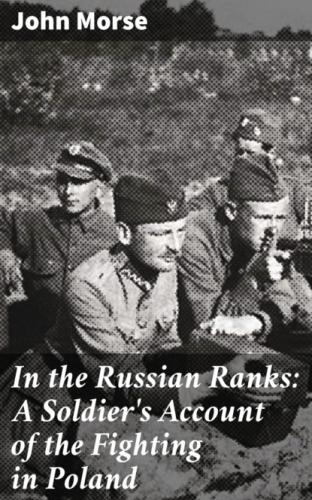John Morse
In the Russian Ranks: A Soldier's Account of the Fighting in Poland
Published by Good Press, 2021
EAN 4064066188467
Table of Contents
CHAPTER I
THE OUTBREAK OF THE GREAT WAR
On the 1st July, 1914, if I could have seen one step ahead in my life's course, this book would not have been written. On the day named I crossed the German frontier west of Metz; and, for the first time, beheld the territory of the Hun.
Always a student of military matters, at this hour I loved war, and all that pertained to war; now I loathe it with an ineradicable hate and disgust, and hope never again to see ground crimsoned with blood.
But at this time I had heard no hint of war in the centre of Europe and of civilization, and no thoughts were farther from my mind than those of martial contention.
My object in going to Germany was business; but also to spend a holiday in a country I had heard friends praise for its beauty and hospitality; and particularly I wished to visit places renowned in history, art and romance. Little I dreamed that I was to see a horrible blight, a foul leprosy, settle on much that had a hallowed past for every cultivated intellect.
I arrived at Metz from Paris via Chalons and Verdun; and, as my time and means were both limited, I went on, after only two days' delay, to Mayence and Frankfort, and thence to Leipzig, where I had some business to transact. On the 16th July I was at Dresden; on the 20th at Breslau; and on the 22nd I arrived at Ostrovo, a small German town barely ten miles from the Russian frontier, and not more than twelve, English measurement, from Kalisz, which is the capital of a Polish province of the same name.
At Ostrovo I went, by previous invitation, to the house of a German friend, from whom I received the most kindly treatment, and to whom I owe my liberty and possibly my life. It will be obvious that I cannot reveal the name of this person, nor the nature of my business with him. It was my intention to remain a month at Ostrovo, which was a convenient place from whence to make excursions to some of the most interesting Prussian towns.
I loved the sight of armed men; and during my journey, as opportunities occurred, I watched the soldiers I saw in the various cities I passed through. I could not fail to notice the great difference in the military forces of the two countries—France and Germany. On the Continent one expects to see a more prominent display of soldiers than is usually the case in our own quiet island home; but there was no great parade of the military element in any of the French garrisons I passed through. In all the large towns a force of some kind was stationed; but in so important a place as Verdun there did not appear to be a stronger military garrison than one would see at such stations in England as Plymouth or Chatham. In the French fortress I saw a battalion marching to the music of bugles. The men did not exceed 600 in number. In another part of the town about 150 infantry were drilling; and many artillerymen were walking about; yet the numbers showed plainly that France was not mobilizing at this time.
As soon as the frontier was passed I saw that quite a different state of things existed. As I left the railway-station at Metz three battalions marched by—two of a line regiment, and a battalion of riflemen, or jagers, distinguished by wearing shakos instead of the nearly universal Pickelhaube, or spiked helmet. These battalions were quite a thousand strong in each case. In other words, they had their full war complement of men. A regiment of hussars was 600 strong; and field-artillery, with fifty-six guns, besides machine-guns, extended about a mile and a half along one of the country roads. Everywhere in Germany the towns, large and small, were crowded with soldiers. Cavalry and artillery and long lines of waggons lined the country highways and byways. I remarked on this to a fellow-passenger who spoke English. His reply was that the troops were assembling for the autumn manœuvres. I was sufficiently surprised to exclaim:—
"What! Already?"
"It is rather early, but they are probably going to have preliminary exercises in the forest-lands," was the reply.
After this I perceived the passenger was
